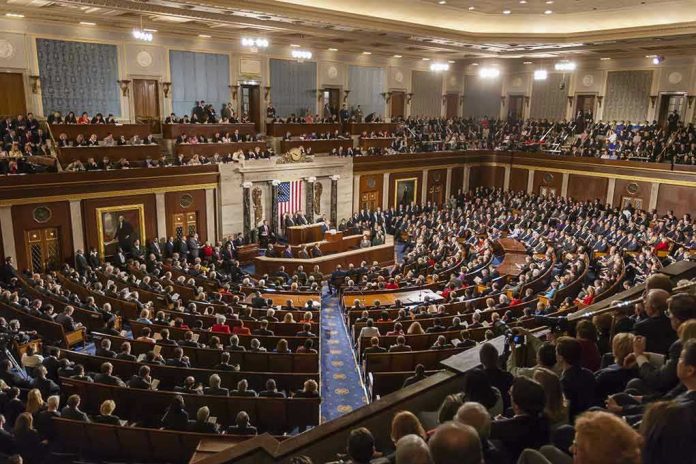
If the Epstein files are released, the world may discover just how deep the roots of power, secrecy, and scandal run in America’s elite circles.
Story Snapshot
- Donald Trump reversed his stance and now urges House Republicans to vote for releasing Jeffrey Epstein files.
- For months, Trump and his party labeled the push for transparency as a partisan “hoax.”
- Bipartisan support and survivor advocacy groups fueled the reversal and the upcoming House vote.
- The move could expose new details, change political fortunes, and set precedent for handling high-profile criminal cases.
Trump’s Sudden Shift: A Calculated Move or Response to Growing Pressure?
Donald Trump’s reversal on releasing the Epstein files is as abrupt as it is consequential. Until days ago, Trump’s position echoed the majority of House Republicans: calls for transparency were dismissed as politically motivated attacks meant to damage reputations and distract from legislative priorities. The narrative changed swiftly when survivor advocacy groups ramped up public pressure, releasing a pointed PSA that challenged lawmakers to act. A surge of bipartisan support inside the House suggested a shift in public mood, and Trump—never one to resist the winds of public opinion—flipped his stance, declaring, “There’s nothing to hide, it’s time to move on.”
The House is now poised to vote on whether to release the files, a move that could either cement Trump’s reputation as a leader for transparency or expose uncomfortable truths about individuals with ties to Epstein. The question on everyone’s mind: Is this a genuine embrace of accountability, or a strategic calculation to get ahead of a story that’s threatening to spiral out of control?
The Political Calculus: Bipartisan Momentum and Survivor Advocacy
Political survival in Washington often depends on reading the room before anyone else does. For months, House Republicans stuck by Trump, publicly resisting the release of Epstein files and calling the effort a “Democratic hoax.” Behind closed doors, however, bipartisan support quietly grew, fueled by persistent lobbying from anti-trafficking organizations and survivors themselves. The advocacy group World Without Exploitation made waves with a PSA broadcast on the very day Trump reversed his stance, amplifying the moral urgency for transparency and justice. The alignment of survivor voices and legislative momentum proved difficult for even Trump to ignore.
Survivors and advocacy groups argue that only full disclosure can ensure justice and deter future abuses. Their message resonated beyond party lines, prompting moderate Republicans and centrist Democrats to join forces. With the House scheduled to vote, the outcome is far from certain, but the momentum for passage appears stronger than ever. The measure’s journey to the Senate, however, is still riddled with political landmines, with some senators wary of the fallout from unsealing potentially explosive documents.
Repercussions of Release: Accountability, Reputation, and Precedent
If the Epstein files are released, the ripple effects will be felt across political, social, and legal landscapes. Sensitive documents could implicate or exonerate dozens of prominent individuals, including politicians, business leaders, and celebrities whose names have swirled in rumor and speculation since Epstein’s 2019 arrest and death. Legal experts warn that transparency must be balanced with due process and privacy rights, especially for those named but not charged. Survivor advocates counter that the public’s right to know outweighs any discomfort for the powerful.
The precedent set by this vote will reverberate beyond the Epstein case. Congressional investigations into high-profile crimes—such as the Mueller Report and 9/11 Commission—have shaped public expectations of government openness. A successful release of the Epstein files could pave the way for greater transparency in future scandals, while a failed or heavily redacted disclosure risks deepening public distrust in institutions already battered by accusations of secrecy and self-preservation.
Expert Analysis: Transparency Versus Political Weaponization
Legal and political experts are divided on the consequences of Trump’s reversal. Some see it as a savvy move to align himself with the growing national consensus for transparency, while others suspect a tactical retreat to avoid being blamed for blocking justice. Academic voices highlight the delicate balance between exposing criminal networks and protecting privacy rights. Survivor advocates maintain that only full disclosure will bring closure and accountability. The media, meanwhile, is bracing for a storm of revelations, speculation, and possible legal action as the House prepares for the pivotal vote.
As the debate intensifies, the question remains: Will the release of the Epstein files illuminate the shadowy corridors of power, or simply fuel another round of political theater? The coming days may define how America handles truth, secrecy, and scandal for years to come.

